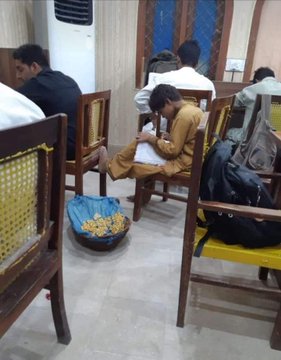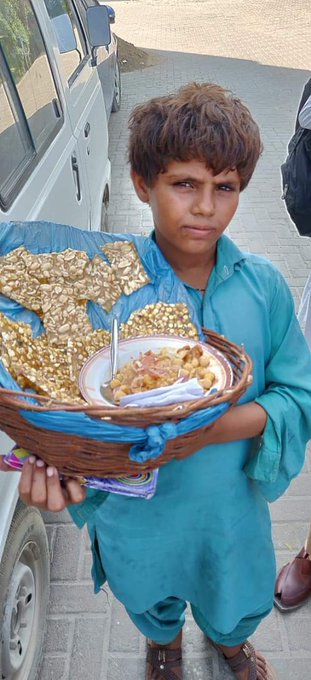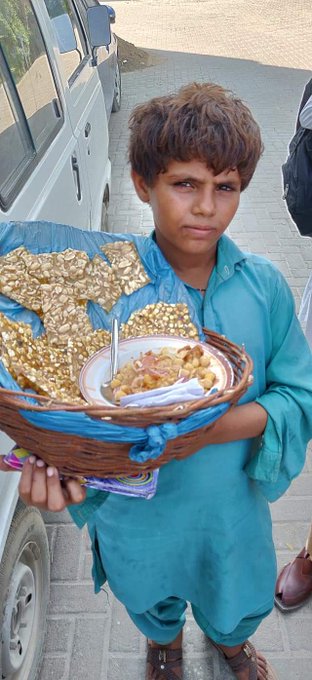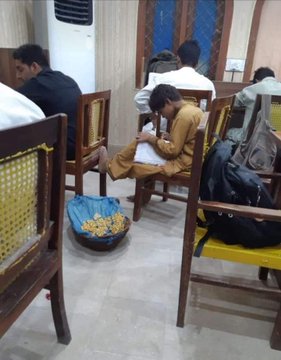M WAQAR..... "A man's ethical behavior should be based effectually on sympathy, education, and social ties; no religious basis is necessary.Man would indeed be in a poor way if he had to be restrained by fear of punishment and hope of reward after death." --Albert Einstein !!! NEWS,ARTICLES,EDITORIALS,MUSIC... Ze chi pe mayeen yum da agha pukhtunistan de.....(Liberal,Progressive,Secular World.)''Secularism is not against religion; it is the message of humanity.'' تل ده وی پثتونستآن
Thursday, August 22, 2019
#PPP - History will only remember Modi as a mass murderer: Bilawal
History will only remember Indian Prime Minister Narendra Modi as a mass murderer, Pakistan People's Party (PPP) Chairperson Bilawal Bhutto Zardari said Thursday.
Addressing a rally in the Gilgit-Baltistan city, Bilawal said Modi — who was involved in the mass murder of Muslims in Gujarat in 2002 — was now killing the Kashmiri folks.
The PPP chair was referring to the large-scale, anti-Muslim massacre 17 years ago when now-PM was the chief minister of Gujarat state and at least 1,000 people, most of them Muslim, were burned and hacked to death.
He warned the Indian premier further: "Try entering Srinagar, he will get to know his place!"
Last week, Prime Minister Imran Khan had warned of severe repercussions of India perpetrating ethnic cleansing in Kashmir.
In a Twitter post, he had said: "In IoK, 12 days of curfew, presence of extra troops in an already heavily militarized occupied territory, sending in of RSS goons, complete communication blackout; with the example of Modi's earlier ethnic cleansing of Muslims in Gujarat.
"Will the world silently witness another Srebrenica-type massacre and ethnic cleansing of Muslims in IoK?" he had Imran asked.
PM Imran had added: “I want to warn international community if it allows this to happen, it will have severe repercussions and reactions in the Muslim world setting off radicalisation and cycles of violence.”
The Indian authorities have maintained a strict clampdown in the Muslim-majority Himalayan region since August 5 when India's Hindu nationalist government of the Bharatiya Janata Party (BJP) abolished Article 370, which granted special status to occupied Kashmir.
EDITORIAL - #Pakistan - Taliban killings
Another day and another targeted killing; this time in Kuchlak, Balochistan. On Friday, a prayer leader was killed while another imam was also assassinated in the same area on the outskirts of the provincial capital on Saturday. In the Friday incident at Al-Haj mosque, the targeted imam was a brother of the Afghan Taliban chief Haibatullah Akhundzada. The Saturday attack killed the imam of Usman bin Afaan mosque. The police say the deceased was an Afghan citizen and had been the imam of the mosque for many years. The new wave of target killings has not been claimed by anyone. The Afghan Taliban, who are negotiating a peace deal with the US in Doha, were quick to release a statement that the killing of their chief’s brother would not impact the talks. These developments suggest that the recent spree of killings stems either from infighting in the Taliban or actions of foreign hostile agencies. Factions within the Taliban might have sprung into action after the insurgents as well as US officials mentioned significance progress in talks. Some foreign agencies that want to thwart the US-Taliban deal could also be behind the fresh bloodshed.
Either way, the recent attacks point towards presence of Taliban elements in Balochistan, creating multiple security challenges for the government and the local population, such as the Shia Hazara. The government must take action against the district administration that let foreign citizens work in local mosques without any check. This cannot happen without the active support of local sleeper or active cells of militants or those sympathetic to militant groups in Afghanistan. The world would again put Pakistan under the spotlight. Over the years, we have been denying the presence of the so-called Quetta Shura of the Afghan Taliban. The security forces must purge Balochistan and other parts of the country from such militant groups. Pakistan should not become the sanctuary of the Taliban for the sake of the security of its own people.
In recent months, security forces have inflicted deadly blows to Baloch insurgents, who claimed the lives of 119 people – including 15 police personnel – and injured 114 in terrorism-related incidents in 2018. The militants must, immediately, be flushed out of Balochistan.
https://dailytimes.com.pk/449761/taliban-killings/
#Pakistan - Nine-year-old Larkana vendor’s sweet dream comes true
A nine-year-old boy’s dream came true on Monday when he got to attend school for the first time in his life.
Muhammad Soomar Chandio’s parents cannot afford to educate him but that didn’t stop him from chasing his dream. The boy sold sweets in the morning and studied at a library in the evening.
A picture of him studying in the CSS hall of the Shahnawaz Bhutto Public Library, with a basket of sweets lying beside him, went viral on social media.

Photo: Facebook/Eastwood Grammar School
The managing director of Larkana’s Eastwood Grammar School, Ahsan Ali Abro, saw the Facebook post, and reached out to people to help him find the boy.
“I was moved after seeing the picture,” Abro told SAMAA TV on its morning show Naya Din on Thursday.
A social activist helped him find the child. Abro met the boy in the library and checked his copies. “I saw potential in the kid,” Abro said. “The child wants to join the Pakistan Army,” he added.
A meeting was arranged with the child’s parents the next day to ask their permission. He lives in Labour Colony. Abro realized that Soomar’s parents were not aware of his studying sessions at the library. “He did not tell his parents about going to the library because he was scared they would scold him,” Abro said.
He successfully convinced the boy’s parents but they only had one concern: money. As Soomar brought home money by selling candy, they worried that his education would create more financial problems for the family.
No alternate source of income has been arranged for the family yet, but Abro said he is trying to arrange an evening job for the child, which would not be considered child labour.
Soomar told SAMAA TV that he is very happy to go to school, and that he is the first child in his family to get an education.
“We are very poor and I have four brothers,” he lamented. “My father is unemployed.”
He appealed to the government to support his family financially. “Those who help the poor, God will always keep them happy,” the child said.
Shortly after Soomar’s pictures went viral on social media two officials of the Sindh government said they wanted to support him. Then education minister Sardar Shah said he would adopt the boy’s expenses.
Wish if @sardarshah1 was education minister today who had set an example by getting his daughter enrolled in a govt school. He would have adopted this boy & got him enrolled in a govt school. Sindh badly needs hardworking & visonary people like Sardar Shah.
I'd love to adopt this Boy,bearing all his expenses and ensuring enrollment forthwith.Already asked my Team at Shahnawaz Library to contact with the family.v need to share the burden of those parents who can't afford and encourage others to enroll their kids in #GovtSchools
111 people are talking about this
Barrister Murtaza Wahab, the Sindh chief minister’s adviser on law, environment and coastal development, also said he wanted to help.
This is a powerful image. The fact that despite all odds this kid is holding on to pen and booms shows real determination, im looking for contact details of this boy & im willing to share the responsibility with @sardarshah1 of this kid. https://twitter.com/HullioSikandar/status/1159825045864292352 …
162 people are talking about this
But neither official has reached out to the boy or the school to pay for his expenses. Abro said that he is handling the boy’s school expenses himself right now. They both tweeted about helping but haven’t been in contact yet, he said.
But even if they do offer to help, they might want to enrol him in a government school and I would rather he be enrolled in a private school, Abro told SAMAA Digital.
The Defiance of Pakistani Atheists
For Pakistani atheists, a hitherto intangible demographic, the 2010s was a decade that simultaneously gave them an identity and took it away. The voice they found in the digital sphere at the start of the 2010s, albeit under the cloak of anonymity, has largely been stifled.
With the boom of the internet and the rise of social media, Pakistani atheists and agnostics found safe spaces online around the turn of the decade. This grew into the creation of a Facebook group, Pakistani Atheists and Agnostics (PAA), and an official website in 2011 – the same year that the country saw its most high-profile victim of a blasphemy accusation, former Punjab Governor Salmaan Taseer.
The atheist boom online was a grand paradox in itself, given that not only was Islamic terrorism at its apogee at the time, but the Taliban and their apologists enjoyed wide approval and sympathy. And yet mainstream media gave coverage to atheists in the country, with English publications even providing space to some camouflaged critiques of Islam at the time as well.
By 2012, the percentage of atheists in Pakistan had doubled to 2 percent from the 1 percent in 2005, as per Gallup polls – although the sample size of a few thousand might not be accurately representative. The Pakistani census doesn’t categorize atheism, a theological position that carries the death penalty in the country.
Pakistan is one of 13 countries where atheism is punishable by death. Although the Sharia clauses infused in the constitution don’t explicitly mention atheism, under orthodox Islamic interpretations apostasy – leaving Islam – is largely interpreted as blasphemy, which is a capital offence in the country.
This prompted many Pakistani atheists to create an anonymous online identity, which they used to express their religious views on social media, eventually forming groups of like-minded individuals.
“For most Pakistani atheists, PAA and other social media [groups] provided space for their first ever meeting with another Pakistani atheist,” the founder of PAA, who goes by the pseudonym Hazrat Nakhuda, told The Diplomat.
“Pakistani atheists then started having meetups [in the early 2010s]. A lot of very active [PAA members] transformed into actual real life groups of friends,” he added.
The growing space for religious dissent meant that many Pakistani atheists created their own websites and Facebook pages, some of which started garnering large followings. Among these was “Rants of a Pakistani Citizen,” which often used irony and humor to critique both religion and state.
“Initially it was surprising to find out so many people share these opinions. And so many people inboxed me saying there are a lot of posts they agree with, but can’t publicly like or comment on them,” said the founder of the page, known among his followers as Rants, while talking to The Diplomat.
This digital space was swiftly taken away by the state in a five-month span. Pakistan passed its cybercrime lawin August 2016 and then secular bloggers and social media activists were abducted in January 2017.
The draconian cybercrime law ensured that blaspheming online carried the death penalty. Meanwhile, the secular bloggers were abducted under the unsubstantiated pretext of running pages that posted “blasphemous content.” The kidnappings were part of a broader crackdown on anonymity.
“It’s ridiculous that anyone would go after people who are just making memes or posting their opinions. It definitely silenced a lot of voices. If I were in Pakistan, I would definitely be more cautious,” said Rants, whose page has been taken down multiple times by Facebook and banned in Pakistan.
Similarly, the PAA group seized to exist, and its Facebook page was blocked in Pakistan. The last tweet sent out by PAA’s handle was in December 2015.
A member of the then PAA, who goes by the name Billi Musashi, revealed that the group had been compromised.
“There were some people who pretended to be atheists to join the groups and then posted screenshots of conversations here and there – and outed [members] too. [As a result] safe spaces and groups have shut down. There is more distrust [now] – atheists feel threatened,” she told The Diplomat.
The Diplomat has further learnt that the Pakistan Telecommunication Authority (PTA) and the Federal Investigation Agency (FIA) had direct access to PAA. The FIA even summoned admins of other secularist groups over blasphemy allegations.
When the Islamabad High Court (IHC) declared that “blasphemers are terrorists,” PTA chairman Dr. Syed Ismail Shah vowed in court hearings to increase the crackdown. That resulted in arbitrary bans on pages like Bhensa, Mochi, Roshni, and satirical news website Khabaristan Times.
The crackdown by the PTA and Pakistan’s Information Ministry led to the BBC doing a documentary called “Diary of a Pakistani Atheist,” underlining the fear among the atheists in the country while also showcasing how they have carved out a sense of community.
An example of the online crackdown pushing atheists to be warier of the digital space can be seen in how the hashtag #ایک_کروڑ_پاکستانی_ملحد or “Aik crore Pakistani mulhid” (10 million Pakistani atheists) that used to trend on Darwin Day annually, hasn’t done so since 2017.
“Perhaps the person who arranged the aik crore hashtag got scared of the likes of the Tehrik-e-Labbaik. Back in the day our biggest threat was a group of hackers in Zaid Hamid’s group. And we thought that was big!” said Hazrat Nakhuda.
The 10 million figure was a presumed extrapolation from the Gallup survey. However, while recent surveys in other Muslim countries have showed a fast-growing trend of individuals leaving Islam, Pakistan hasn’t had any survey on atheism since 2012.
In fact, atheism in Pakistan has had barely any coverage, not even in the international media, since September 2017 when the United Nations Human Rights Council took up a written statement by the International Humanist and Ethical Union entitled “Dangerous situation for Freethinkers and Humanists in Pakistan.”
In private conversations, many who self-identify as atheists, across the demographic divide, reveal that while there has been a mass exodus of atheist accounts from social media, safe spaces for the freethinkers still exist across the country, including rural areas where many of the PAA members came from.
Many of these spaces exist in educational institutes, ranging from closed groups to open debating societies, which have traditionally allowed room to discuss the philosophical aspects of irreligion as long as one steers clear of mocking Islamic personalities. However, many confess that particular line is getting harder to discern, given how even educational institutes aren’t entirely secure from fatal blasphemy accusations.
The case of Mashal Khan, a journalism student at Abdul Wali Khan University lynched by fellow students in April 2017 is still fresh in memory for many. Junaid Hafeez, a former professor at Bahauddin Zakariya University, has been languishing in prison since March 2013 over a blasphemy allegation that legal experts say wasn’t even worthy of an FIR. The lawyer who took up Hafeez’s case was shot dead in May 2014.
And yet Pakistani atheists say that the trend of abandoning religious orthodoxy has never been higher among the youth as it is today.
“This generation is fast being exposed to other people’s cultures and ideas and is realizing that religious belief is just an accident of birth,” Ali A Rizvi, the Pakistani-Canadian author of The Atheist Muslim: A Journey from Religion to Reason, told The Diplomat.
“A lot of young people write to me and say that’s exactly what I am: an ‘atheist Muslim.’ [Because] many of the Pakistani atheists remain closeted – they are atheists, but have to present themselves as Muslim,” added Rizvi.
Rizvi, who also cohosts “Secular Jihadists,” says his podcast has a large following from Pakistan.
“The ongoing online crackdown isn’t going to affect the growth of atheism in Pakistan. You can temporarily silence them through terror and fear, but you can no longer force people into thinking [certain] things. This is going to severely backfire on the Pakistani state and establishment,” he said.
Pakistan: Resurgent Terror In North Waziristan – Analysis
By Tushar Ranjan Mohanty
Two Security Force (SF) personnel were killed in an improvised explosive device (IED) explosion in Laddha tehsil (revenue unit) of North Waziristan District in Khyber Pakhtunkhwa (KP) on August 17, 2019.
Three SF personnel were killed and another was injured in a terrorist attack on the Malkan SF checkpost in the Razmak area of North Waziristan District on August 2, 2019.
Six Army personnel were killed when terrorists from across the Afghanistan border opened fire on a border patrolling party near the Gurbaz area of North Waziristan District on July 27, 2019. “Terrorists from across the border fire raided on Pakistan Army border patrolling party. 6 soldiers embraced shahadat,” a statement released by the Inter-Services Public Relations (ISPR) read.
One soldier was killed and five were injured in two separate bomb explosions in North Waziristan District on July 10, 2019. The first incident occurred near the Kharqamar check-post in Data Khel tehsil. Officials said that a bomb disposal squad was searching the area when a remote-controlled device went off. Four SF personnel were injured. One of the injured personnel later succumbed to his injuries.
The second blast took place near Mir Ali town when an SF vehicle hit an IED while it was on its way to the Army’s Golden Arrow School, which had been hit by a rocket.
Three Army officers and a soldier were killed in an IED explosion in the Kharqamar area of North Waziristan on June 7, 2019. An ISPR statement disclosed that four soldiers also sustained injuries.
According to partial data compiled by the South Asia Terrorism Portal (SATP), North Waziristan has accounted for a total of 24 SF fatalities in terrorism-related violence in 2019, thus far (data till August 18, 2019).
During the corresponding period of 2018, there were 16 such fatalities, and in 2017, 2016, 2015, 2014, and 2013 there were zero, four, 21, 51, and 65 such fatalities, respectively.
North Waziristan recorded a total of 30 SF fatalities through 2018, five in 2017, four in 2016, 29 in 2015, 70 in 2014, and 88 in 2013.
After a declining trend between 2014 and 2016, there has been an evident surge in violence against SFs in North Waziristan since 2017.
On the other hand, the number of militants killed has drastically declined since 2015, with the exception of 2018.
The ratio of SFs: Militants killed, which remained in favour of SFs till 2017, was reversed for the first time in 2018, at 1.07:1 and has worsened drastically to 8:1 in 2019.
Not surprisingly, the overall situation has also deteriorated. Incidents of killing had fallen to their second lowest, at five, in 2017, but went up to 14 in 2018 and have already touched that number (14) in 2019.
The total number of violent incidents has also increased.
Militancy-related Fatalities in North Waziristan: 2000*-2019**
| Year | Incidents | Civilians | Security Forces | Militant | Not Specified (NS) | Total |
| 2000 | 0 | 0 | 0 | 0 | 0 | 0 |
| 2001 | 0 | 0 | 0 | 0 | 0 | 0 |
| 2002 | 0 | 0 | 0 | 0 | 0 | 0 |
| 2003 | 1 | 3 | 0 | 0 | 0 | 3 |
| 2004 | 6 | 1 | 6 | 5 | 0 | 12 |
| 2005 | 40 | 64 | 36 | 88 | 5 | 193 |
| 2006 | 77 | 47 | 74 | 332 | 6 | 459 |
| 2007 | 116 | 170 | 199 | 474 | 73 | 916 |
| 2008 | 50 | 105 | 11 | 70 | 68 | 254 |
| 2009 | 94 | 158 | 53 | 255 | 38 | 504 |
| 2010 | 152 | 57 | 11 | 750 | 33 | 851 |
| 2011 | 87 | 91 | 27 | 362 | 21 | 501 |
| 2012 | 70 | 44 | 73 | 336 | 0 | 453 |
| 2013 | 64 | 53 | 88 | 179 | 6 | 326 |
| 2014 | 129 | 23 | 70 | 1580 | 0 | 1673 |
| 2015 | 60 | 4 | 29 | 758 | 0 | 818 |
| 2016 | 12 | 1 | 4 | 139 | 0 | 144 |
| 2017 | 5 | 6 | 5 | 10 | 0 | 21 |
| 2018 | 14 | 6 | 30 | 28 | 0 | 64 |
| 2019 | 14 | 2 | 24 | 3 | 0 | 29 |
| Total | 991 | 835 | 740 | 5396 | 250 | 7221 |
| *March 6, 2000; **August 18, 2019; Source: SATP |
North Waziristan was one among the seven Agencies of the erstwhile Federally Administered Tribal Areas (FATA) and was previously known as North Waziristan Agency (NWA). However, on May 31, 2018, FATA was merged with the KP Province and its status was changed from Agency to District, as was case of the other six agencies.
North Waziristan shares borders with Bannu, Tank, Dera Ismail Khan and Kurram Districts of Khyber Pakhtunkhwa in the North and Northeast; Sherani and Musakhel Districts of Balochistan to the south; and Khost, Paktia, and Paktika Provinces of Afghanistan to the west and north-west. The strategically central and vulnerable location gives it tremendous importance for the militants.
North Waziristan has been a hotbed of terror since violence surged within Pakistan in 2007. The District (and previous Agency) has recorded a total of 7,221 fatalities [835 civilians, 740 SF personnel, 5,396 terrorists and 250 not-specified (NS)] since March 6, 2000, when SATP commenced compiling data on Pakistan. These fatalities have been recorded in a total of 991 incidents of killing, of which 548 were ‘major incidents’ (each involving three or more fatalities). These major incidents resulted in the death of 5,962 persons (573 civilians, 566 SF personnel, 4,612 militants and 211 NS).
Things changed with the launch of operation Zarb-e-Azb (Sword of the Prophet) in North Waziristan, on June 15, 2014, in the aftermath of the attack on the Jinnah International Airport, Karachi, on June 8-9, 2014. At least 33 persons, including all 10 attackers, were killed in the Karachi attack. On June 15, 2016, the then Director General (DG) ISPR Lieutenant-General Asim Saleem Bajwa declared at a Press Conference,
| June 15 is a historic day for us. Before Zarb-e-Azb, the country, including North Waziristan was plagued with terrorism. 490 soldiers of the Pakistan Army have died in the line of duty during Operation Zarb-e-Azb. Over a period of two years, an area of 3,600 square kilometres in North Waziristan has been cleared of terrorists. A total of 3,500 terrorists, including 900 Lashkar-e-Islam (LI) were killed, leaving 992 hideouts destroyed. Army successfully seized 253 tons of explosives – enough to make IEDs from for at least 15 years (sic). |
Though it was the epicentre of all terrorist activities, Pakistan had long delayed the operation in North Waziristan, as the region also provided shelter to its own terrorist proxy, the Haqqani Network. The Network had long been accused by the United States of attacking allied forces in Afghanistan. Significantly, in the ISPR Press Conference and a continuous succession of the agency reports, the Pakistani Army had not killed even a single terrorist drawn from the Haqqani Network, despite the group’s safe haven in North Waziristan. According to unnamed tribal sources the Haqqani Network, an affiliate of the Afghan Taliban, had been based in North Waziristan for decades, but abruptly left the area even as Operation Zarb-e-Azb commenced on June 15, allegedly tipped off by the military. Many Haqqani members shifted across the border to Afghanistan or left for other parts of Pakistan.
Meanwhile, the recent attacks on SFs in North Waziristan clearly demonstrate that the terrorists, despite their losses, retain significant capacities to strike. The worsening ratio of SFs to militants killed, underlines this reality.
Unsurprisingly, as in the past, the terrorists have started asserting their dominance by issuing threats and imposing their diktats on the people. Most recently, on July 31, 2019, the Tehreek-i-Taliban Pakistan (TTP), in a one-page message in Urdu seen by people in Miranshah, the North Waziristan District headquarters, warned,
| We remind you [residents] that similar statements issued by Taliban several times in the past had fallen on deaf ears, but this time we are going to take to task those who violate the Taliban order. There will be no use of DJs, neither inside the house nor in open fields and those ignoring the warning will be responsible for consequences. Polio workers have been asked to do finger-marking of children during the vaccination campaign, but told not to administer polio drops to children or be ready to face dire consequences for defying the instruction. Women shouldn’t go out of their homes alone as it is harmful for our society. There is one informer of Mujahideen in every three people and it was misconception on the part of the people to think we will not get information about non-compliance of our order. Follow the order or be ready to face worst consequences. |
The rising attacks on SF personnel in North Waziristan and the increasing stridency of extremist diktats refutes Government and Army claims of having completely sanitised the area of terrorism.
Subscribe to:
Comments (Atom)







